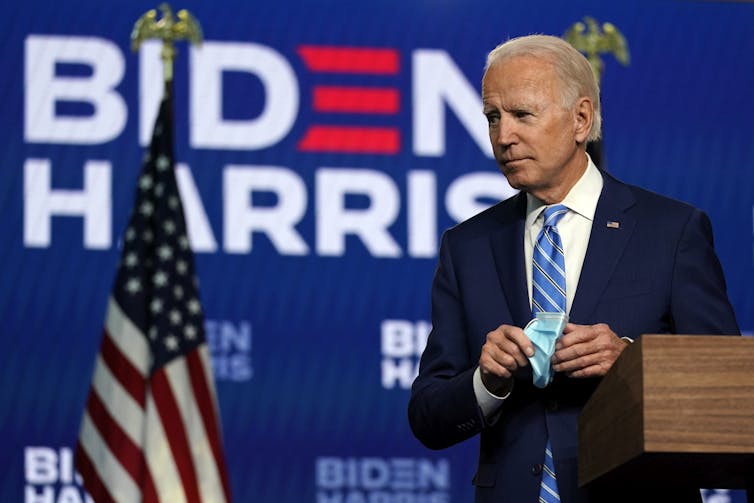Let’s assume Joe Biden narrowly wins the electoral college, and the Trump team lodges a series of court challenges to overturn results in Michigan and Pennsylvania, possibly elsewhere.
The cases may drag on for the rest of the year.
Trump has already sent out a fundraising appeal for money to “FIGHT BACK”, and has signalled he will pursue appeals all the way to the Supreme Court.

The cases will revolve around the acceptance of late ballots – that is, votes that arrive after last Tuesday, November 3, even if they are postmarked earlier. Each state has its own requirements for accepting mail-in votes, and the Trump lawyers will explore every possible objection.
There is a conservative majority on the US Supreme Court, but this does not guarantee Trump would win appeals. When the court last decided an election, after the “hanging chads” dispute that delivered Florida to George W. Bush in 2000, it divided on partisan lines.
From our partners:
But judges are conscious of their historical legacy and they will act cautiously. If Trump is appealing results in several states, it is unlikely all appeals will succeed.
So let’s assume that, after a month of disputed returns, Biden is able to muster the bare minimum of 270 electoral college votes and Congress ratifies his election in January. On January 20 2021 he would become the 46th president of the United States.
Biden would immediately face a bitterly divided country, with millions of voters convinced he’d stolen the presidency. The Democrats’ almost certain failure to capture the Senate means he would struggle to win support for most of the key legislation he has promised.
At this point, we need speculative fiction rather than political science to predict what might happen next. If congressional Republicans adopt a policy of total resistance to the Biden presidency, he will struggle even to appoint a cabinet, as all positions need to be ratified by the Senate.
Over the past four years, the Republican Party has become essentially the party of Donald Trump, and those senators who have retained their seats will feel even more indebted to him.
Biden’s central pitch was that he could heal divisions and bring Americans together again. It was his persona as a political veteran who had the capacity for empathy and working across party lines that persuaded the Democrats to rally behind him.
But for Biden to succeed in healing the country, there needed to be an undisputed win for the Democrats across the board, which would allow a new administration to quickly take control. Biden is far less well equipped to govern a country where millions of people will not see him as their legitimate president.
On ABC television, Leigh Sales expressed her amazement that in a country torn apart by a major epidemic, economic distress and racial discord, the incumbent president could remain seriously competitive. The Democrats had assumed the impressive increase in turnout would work in their favour and they won swings in some areas of the country, especially in suburbia.
But Trump also increased his vote among some groups the Democrats had taken for granted, such as Hispanics in Florida and to a lesser extent Texas. Trump was able to energise millions of first-time voters and, against expectations, won a majority of white women. These are rough estimates based on available exit polling data.
In retrospect, the Democrats badly misjudged the mood of the country, thinking people would vote for a grandfather figure who promised safety. Against Trump, Biden seemed doddery and a relic of Washington politics, even though he is only four years older.
African-Americans remain the most loyal Democratic voters, so it is surprising many young black men, facing ongoing police brutality and unemployment, were not motivated to turn out to vote for Biden.
Trump appears an aberration to those of us who expect politicians to exhibit a certain degree of civility and a willingness to compromise. But the past decade has seen the rise of macho autocrats, men such as Duterte in the Philippines, Bolsonaro in Brazil, Orban in Hungary.
If we accept the United States is less exceptional than it likes to believe, it is not so surprising that so many might be drawn to Trump.
Dennis Altman, Professorial Fellow in Human Security, La Trobe University
This article is republished from The Conversation under a Creative Commons license. Read the original article.













